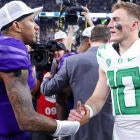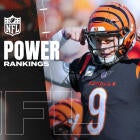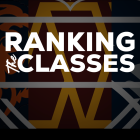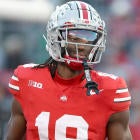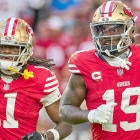ATLANTA – A look of determination came over Troy Vincent's face as he strode from the back of the conference room at Morehouse College up to the front projector on Tuesday afternoon.
A long morning session of presentations at the NFL's QB Coaching Summit was about to break for lunch, punctuated by detailed and moving discussions led by former NFL head coach Jim Caldwell, African-American coaching pioneer Jimmy Raye, college coach Shaun King, former NFL coordinator Pep Hamilton, Maryland head coach Mike Locksley and Clemson coordinator Tony Elliott.
Vincent, the NFL's head of football operations and one of the hosts of the event, like others was getting overcome with emotion watching these men tell their stories and share their wisdom, and, at times, narrate their struggle as a black coach in football. This two-day seminar was put in place to shed light on the plight of minority coaches on the offensive side of the ball and to help identify and cultivate a pipeline of diverse coaches with a background coaching quarterbacks to help address the dearth of those men as head coaches and offensive coordinators in the NFL right now.
For years now, the numbers have been trending in the opposite direction, and Vincent's frustration with this has become increasingly evident to many at the league office and around the game at all levels. Only four men of color coach the 32 NFL teams – Mike Tomlin (Steelers), Anthony Lynn (Chargers), Brian Flores (Dolphins) and Ron Rivera (Panthers) – and only one African American truly has authority over an NFL team's personnel as a general manager (Chris Grier of the Dolphins), as Doug Williams has the GM title but not final say on the roster or transactions in Washington (he reports to team president Bruce Allen). At a time when owners seem infatuated with hiring the next hot young quarterback guru/offensive play caller, only two men of color (Eric Bieniemy, Chiefs, and Byron Leftwich, Buccaneers) hold offensive coordinator titles in the league.
By lunch break on the second day of this event, with it beyond apparent there was no shortage of qualified and capable men of color who could be holding these positions among the men merely assembled in this room, Vincent made what would be his final remarks at the seminar.
"God damn it, we know this game," he said as he paced the front of the room, preaching to men who had long been already converted. "We can coach it and we can teach it … All we're asking for is a fair process."
For four hours that morning, an assortment of highly-respected and proven African American coaches had held court to assist several dozen college and pro coaches with varying experience, sharing intimate details of how to prepare for job interviews, explaining what precisely would be expected of them as a position coach or coordinator or head coach at the NFL level, sharing, literally, their playbooks and outlining concepts and play design, eager to answer any and every question possible. The night before, those younger coaches were able to network and socialize with general managers, former general managers and head coaches before and after panel discussions featuring former Bengals coach Marvin Lewis, former Giants GM Jerry Reese, longtime Ravens GM Ozzie Newsome, and current Vikings GM Rick Spielman, who, along with former Ohio State coach Urban Meyer, were the lone white participants.
Vincent, an outward advocate for more diversity in the coaching and management ranks well before this event, is caught in the unenviable position as often being the man at the league office to figure out what went wrong when teams, time and time again, chose not to hire African American men they interviewed or treat the Rooney Rule at times as a box that merely needs to be checked. He hears it from both sides – why some candidates believe the process was unfair, how little time they got with an owner and why some teams felt like a particular minority candidate was not ready for the job. That cauldron started to boil within, it seemed, as he continued his address.
"This man has two Super Bowls rings," he said of Reese, "and I can't get him an interview." Vincent noted the "systemic" problems that seemed afoot. "We have to fight this at its core," he went on.
Vincent alluded to Caldwell, who has been knighted as an offensive mind by no less than Peyton Manning and managed to turn the lowly Lions into a winning team and has a winning record as a head coach. "He's not even invited to the party," Vincent said, pointing to the tepid-at-best interest in Caldwell while a group of unproven young, white offensive coaches were all the rage in the last hiring cycle. "We can sell a non-winning white coach, but we struggle to sell a winning black coach."
He implored the network of diverse coaches in the room, once more, to look out for each other. "We have to be the search firm," he said, as teams who insist on using these firms have been less than creative with their Rooney Rule job selections. Vincent, a former star defensive back, tried to make sense of a process whereby, so often, an African American candidate goes from the "hot guy" asked to interview for several head jobs one year, only to be cast aside entirely the following year if his team slumps.
"Very seldom does that happen to our counterparts," Vincent said. "We have to fix that."
He pleaded with the men in the room to continue accepting interview requests even if the process seemed rigged to one particular outcome with it clear the team had a favorite for the opening. "We've got to take the interview and put out best foot forward," he said. He explained how the league office was working to ensure teams interview more than one "Rooney Rule" candidate and railed against the instances where an African American interviewee isn't given an opportunity to truly talk football or where the team's interest might not seem genuine.
"There's a game inside the game that we have to get better at," Vincent said.
Sharing experiences ... and speaking frankly
That in part was the genesis of the NFL's more comprehensive involvement with this event. It was started a year ago by Williams and his friend James "Shack" Harris, two former Grambling quarterbacks and lifelong friends who share the unique bond of being among the first black starting quarterbacks in the NFL and among the league's first black personnel men, as well, after their playing careers. They wanted to help identity and cultivate a score of diverse coaches who were already coaching quarterbacks at some level, or who aimed to do so, to try to address the declining numbers in the NFL ranks.
Vincent and commissioner Roger Goodell made it clear to those trailblazers that they shared that vision and wanted to create an annual event that built upon their efforts, joining the Black College Football Hall of Fame as co-hosts. "Troy and the commissioner recognized that this was important," Williams said. "That's why we're here."
Williams and Harris went through the ugly statistics on diversity in coaching at the event's kickoff (on top of those I already noted, there are only four African American QB coaches in the NFL). "We think there are coaches in this room that can coach the quarterback and can be an offensive coordinator and can be a head coach," Harris said. "All they need is an opportunity."
Vincent said: "There is no talent and there is no pipeline (of African American QB coaches). I've heard that … Well, they're here, and they're all in one place. So let's debunk that myth of 'they don't exist.' They're all assembled here and hopefully some of these names begin to be socialized.
"Some of these men here have won national championships. They have developed some of the top quarterbacks in the country. But they're not spoken about. So they are all assembled here for two days sharing information and philosophy and hoping that this is the beginning of accelerating their long-term goals and aspirations."
Beyond some very nuanced X's and O's chalk talks, the summit was also about creating a safe space where these men could share their experiences and speak frankly and learn from each other. They could delve into whether or not it is frowned upon to create relationships in the media, and how much to tell their stories or advocate for themselves in the press. If or when should they hire an agent? They could ask men like Reese and Newsome, who have been involved in hiring coaches, such questions. How much of their ambition should they share with their current head coach? How should they acquit themselves with NFL scouts when they come to their colleges to evaluate players?
No inquiry was off limits and no one was trying to obscure the depths of this problem. Transparency was the rule, which included allowing the media to sit in on all sessions (not once did anyone ask that a statement be off the record). Merely identifying and recognizing these men alone – like Georgia Southern wide receivers coach Lamar Owens or Missouri offensive analyst Garrick McGee or Colts QB coach Marcus Brady or Michigan offensive coordinator Josh Gattis – mattered, believe it or not, as even some of the most well-connected African American executives in the game were not aware of so many men of color already with QB/OC chops.
"This book and these names will go back to Baltimore and will go back to Minnesota and will go back to Miami," Newsome said during the general manager session on Monday, holding the pamphlet that all the coaches assembled here were provided as he spoke. "I didn't know that there was this many African Americans that were involved with coaching the quarterbacks, and not just quarterbacks on the college level. Now I do. So this is my thanks, Shack and Doug and Troy, for putting this on so that these guys can have some visibility.
"So when I am talking with another club or another GM I can start to mention names, because I have this book. This book is going back to Baltimore. I've got names and I can now advertise for you guys … I only knew about two or three of you guys, but now I've got the Bible that I can use to take back or give it to my staff and say, 'Tell me about this guy.' …
"And hopefully, three years from now or four years from now, because of this and Doug and Shack and Troy we can see that trend change. I would bet money that if (Ravens owner) Steve Bisciotti walked in here he wouldn't know there was this many guys coaching quarterbacks or working as offensive coordinators."
Spielman, who, like the Vikings, has long been an advocate for diversity, noted that his ownership created two offensive quality-control positions on the offensive side of the ball. "I told coach (Mike) Zimmer that both of those should be filled by minorities," Spielman told the group. "It's easy to go out and find white people to fill those, to be honest with you. But to find diversity on the offensive side of the ball, we did a nationwide search and actually talked to a couple agents … and found two top quality that were actually GAs at the collegiate level … And they'll switch over to the quarterback room and to different positions to continue to try to grow on the offensive side of the ball."
Grier urged those assembled "to make themselves uncomfortable," and "reach out" to NFL area scouts on campus to begin to network more and build some contacts. Reese implored them to try to connect with a top coaching agent if possible, who can help publicize and market them. "If we're going to keep it real in here, that's part of it," he said, a nod to playing the game itself. "An agent can definitely help you – that's just the way it is."
Nothing was sugar coated. Coaches were urged to work as long and hard as possible without fraying their families. There would be instances where nepotism and cronyism would prevent the best man from getting the job. Conversations were frank, with Reese at one point asking everyone in the room if they thought minority candidates got a fair shake.
"It feels like we have to be twice as good," said Reece, whose resume one would have thought would've landed him more serious consideration for GM jobs since being let go by the Giants. "If you have to be twice as good, then accept that challenge."
Grier implored them: "Don't get frustrated. It took me 20 years to get a GM interview. Unfortunately, we are held to a higher standard at times."
'Take this and make it your own'
The second day dealt primarily with nuts and bolts information that any up-and-coming coach would savor. Caldwell gave a rousing account of his career and provided every participant what amounted to a life's work, a 278-page file encompassing his approach to an NFL head coaching interview.
It was meticulous, including advice on how to schedule an offseason workout plan, what kind of questions to ask owners and GMs, how to research an organization, which types of software they must master in the pro game (PowerPoint, Visio, Excel, XOS). He explained why he'd carry a small projector in his briefcase in case a team was not equipped. He urged them to read the CBA every year and study how the cap and contracts work. Overdress if you have to; you can always take a coat or tie off. Force yourself to study the other side of the ball.
"Don't chase the money, and be intentional about the jobs that you take," Caldwell urged them as they pursue opportunities to climb the ladder.
It was a masterclass in preparation and detail and left one stunned that, somehow, a one-year coordinator (Matt LaFleur) with no head coaching experience could have possibly put together a better presentation to the Green Bay Packers than Caldwell did to get that job. He could only touch on a fraction of what was in the file -- practice scripts, philosophies, weekly schedules -- they would receive due to time constraints.
"You take this and make it your own," said Caldwell, who was trying to give them as much information in a half hour that they couldn't get anywhere else.
Former Browns coach Hue Jackson detailed the specifics of what an offensive coordinator must master and Raye took them inside his offense and verbiage and the types of things they must be able to break down on film and explain about their offense in interviews. King, a former NFL QB and the running backs coach at South Florida, and Gattis and McGee and Pat White, former NFL QB now coaching them at Alcorn State, and others broke down concepts and plays they love. Locksley took them deep inside the RPOs – all the rage in the NFL now – that he ran so well at Alabama as a coordinator there, and Elliott did the same for the Clemson RPOs. Hamilton was a treasure trove of handouts and spreadsheets on how to prepare a QB from week to week.
The spirit of brotherhood and kinship was infectious and this is an event that Vincent believes has the capacity to grow. Ideally, there would be more non-whites engaged as well, here to broader their networks as GMs or head coaches and find new candidates for potential openings. Vincent reached out to all of the hot coaching names as one would expect – since certain coaching trees seem to be particularly en vogue these days, with few takers. He noted the Vikings, Cardinals and Falcons as teams always willing to get involved in these ventures, when addressing the group, and reiterated it with me as well.
"After the third time I'm not asking again," he said. "I'm not into begging. We've got too much work to do. You have to want to be here."
Next year, perhaps more will. With the top 64 jobs in football operations filled by just six people of color, there is nowhere to go but up. Things can only get better, one assumes.
"There are a number of teams out there that do an excellent job, and you see the effects of what I call the diversity of leadership," said former Cardinals GM Rod Graves, who now heads the Fritz Pollard Alliance, which promotes diversity in the NFL. "But I think, by and large, it has not been a total commitment.
"What we understand about diversity is it has to be intentional, and that's what we've seen with the NBA, and the message we see in corporate American in some spots. But I think in order for it to really work and be effective, it has to truly be a commitment. And that's what we're working towards."














